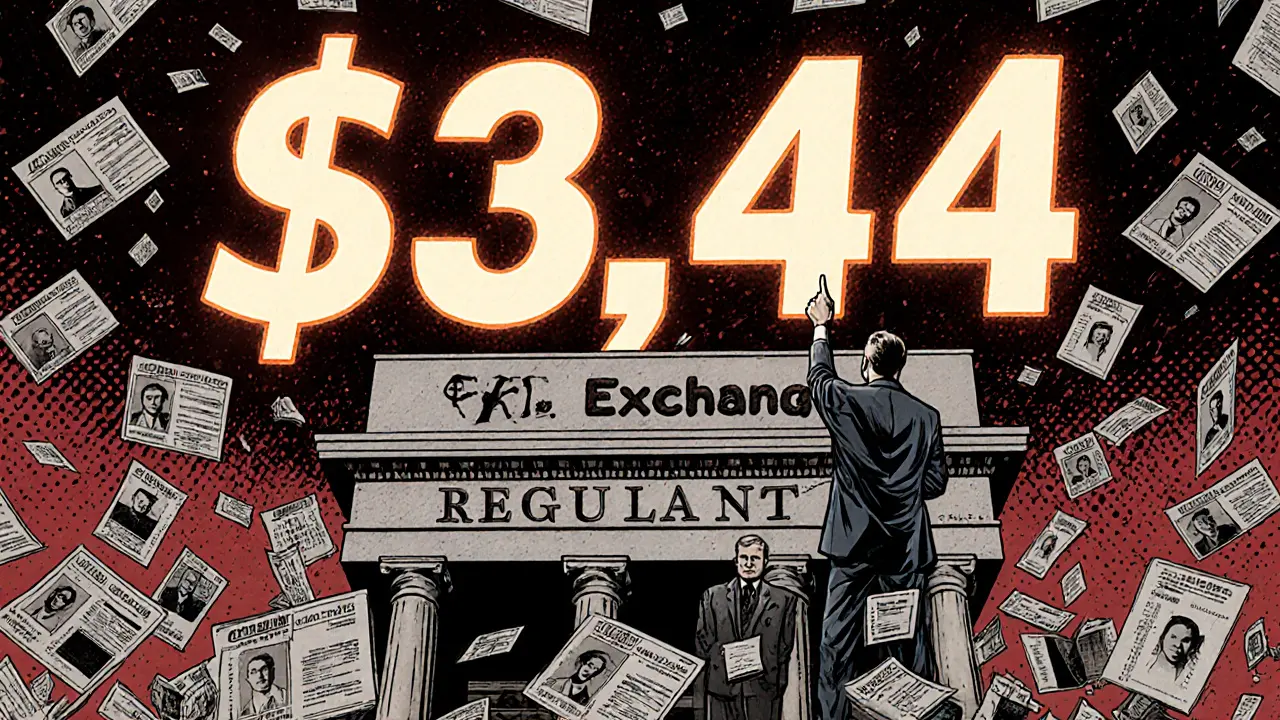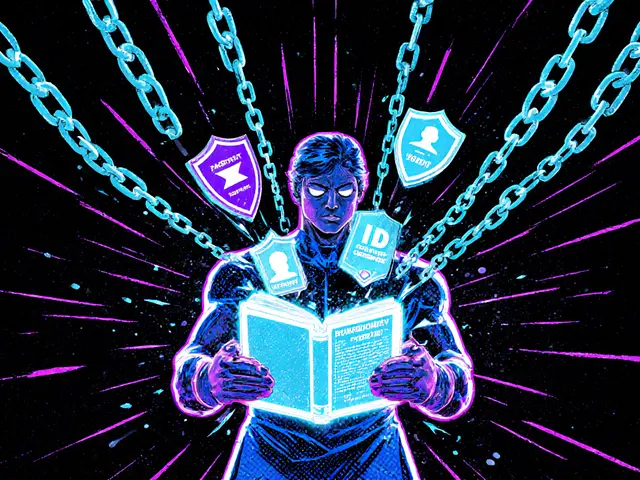
KYC Penalty Calculator
How It Works
Based on South Korea's Special Financial Transactions Act, each KYC violation carries a maximum penalty of 100 million KRW ($68,500 USD). This calculator estimates potential penalties for exchanges with failed KYC checks.
(Based on 100 million KRW per violation)
South Korea’s largest cryptocurrency exchange, Upbit, came within hours of being hit with a $34 billion fine in early 2025 - the largest regulatory penalty ever proposed against a crypto platform in history. The reason? Thousands of failed customer identity checks. Not fraud. Not hacking. Just sloppy paperwork.
Upbit, run by Dunamu, handles over $8 billion in trades every single day. It’s the go-to platform for millions of South Korean investors. But behind the scenes, regulators found that between 500,000 and 700,000 customer accounts had ID documents with blurry, cropped, or completely unreadable photos. Some were screenshots from old phones. Others were copies of IDs with faces cut out. None met the legal standard for Know Your Customer (KYC) rules under South Korea’s Special Financial Transactions Act.
The Financial Intelligence Unit (FIU), part of the Financial Services Commission (FSC), uncovered these flaws during a routine license renewal audit in late 2024. They didn’t find evidence of intentional fraud. Instead, they found a system that had grown too fast to keep up with basic compliance. Upbit had automated its onboarding process to handle explosive demand, but the software couldn’t tell if a photo was real or if the person in it was even the account holder.
Under South Korean law, each KYC violation can carry a fine of up to 100 million Korean won - about $68,500. Multiply that by 500,000 violations, and you get the $34 billion number. It wasn’t a guess. It was a legal calculation. And it scared the entire crypto industry.
Why the Penalty Wasn’t Actually Paid
The $34 billion figure was the maximum possible under the law. It was never meant to be applied. Regulators use these numbers to send a message, not to bankrupt companies. In reality, Upbit was given a chance to fix things.
On January 20, 2025, Upbit submitted its response to the FSC. They admitted the failures but said they weren’t deliberate. “We didn’t know how many overseas platforms were registered,” said a company spokesperson. “Blockchain is global. We tried.”
The FSC didn’t buy the excuse. But they also didn’t want to crash the market. On January 21, they announced a partial suspension. Upbit couldn’t accept new deposits or withdrawals for three months. Existing users could still trade. No new sign-ups. No new money in. That was the real punishment.
Imagine running a bank and suddenly being told: “You can’t take new customers. And you can’t let anyone move money out.” That’s what happened. The market reacted instantly. Bitcoin dropped 8% in South Korea. Trading volumes on other local exchanges like Bithumb and Korbit spiked as users scrambled to move accounts.
The Bigger Picture: South Korea’s Crypto Crackdown
This wasn’t an isolated case. It was part of a coordinated government push to clean up the crypto sector.
In February 2025, police arrested a man known as “Jon Bur Kim” for running a $48 million crypto scam using a fake token called Artube (ATT). The same week, South Korea launched a new crypto crime unit with dedicated investigators, forensic analysts, and blockchain trackers. They weren’t just watching exchanges - they were hunting scammers, pump-and-dump groups, and money launderers.
Upbit’s case was the warning shot. The government was telling every crypto platform: “You’re not too big to fail. You’re not too popular to ignore.”
Before 2025, South Korea’s crypto rules were patchy. Exchanges operated in a gray zone. Now, the FSC is drafting a full legal framework - the first of its kind in Asia - set to be finalized by the end of 2025. It will require all exchanges to use certified KYC software, submit real-time transaction reports, and prove they’ve vetted every overseas partner they work with.

What Upbit Did Wrong
Upbit didn’t break the law on purpose. But they broke it badly. Here’s what went wrong:
- Automated ID checks failed: Their system accepted blurry, low-res photos because the software only checked file size and format - not clarity or authenticity.
- No human review: They cut costs by removing manual checks. One person reviewing 10,000 IDs a day is better than zero.
- Overseas partners unverified: They traded with foreign platforms that weren’t registered in South Korea. That’s a direct violation of AML rules.
- No audit trail: Regulators couldn’t trace which employees approved which IDs. No logs. No accountability.
It wasn’t a hack. It was negligence. And in crypto, negligence can cost you everything.
How Other Exchanges Are Responding
After Upbit’s suspension, every major crypto platform in Asia scrambled to fix their KYC systems.
BNB Chain’s local partner in Thailand upgraded to AI-powered facial recognition that checks for photo manipulation. Japan’s bitFlyer added mandatory video verification for all new users. Even Coinbase, which operates globally, started requiring South Korean users to upload government-issued IDs with live selfies - all verified by a third-party provider approved by the FSC.
The message was clear: If you want to serve South Korean customers, you need to meet their standards. No exceptions.
Compliance tech startups saw a boom. Companies like Trulioo, Jumio, and Onfido reported a 300% spike in inquiries from Asian exchanges in Q1 2025. One firm told Bloomberg they had 17 new clients in two weeks - all from Korea.

What This Means for You
If you trade crypto in South Korea:
- Your account might be flagged if your ID photo isn’t crystal clear.
- You might need to re-verify your identity - even if you’ve been using the same exchange for years.
- Withdrawals could be delayed if the exchange is under review.
If you run a crypto business:
- Don’t rely on software alone. Add human checks.
- Use FSC-approved KYC vendors. Don’t guess.
- Keep detailed logs. Regulators will ask for them.
- Don’t partner with unregistered overseas platforms. Even if they’re popular.
Upbit’s case proves that size doesn’t protect you. Speed doesn’t excuse sloppiness. And in crypto, compliance isn’t a cost - it’s your license to operate.
The Long-Term Impact
Upbit is still operating. They’ve hired a new compliance team of 87 people. They’ve installed real-time AI tools that flag blurry IDs before they’re approved. They’ve stopped working with any overseas platform that can’t prove its registration.
But the damage is done. Their market share dropped from 52% to 38% in six months. Smaller exchanges gained ground. Users switched. Trust took a hit.
And the ripple effect? Global regulators are watching. The U.S. SEC, the EU’s MiCA framework, even Singapore’s MAS - they’re all using Upbit’s case as a benchmark. If a $34 billion penalty could happen in Korea, it could happen anywhere.
The crypto industry thought it was untouchable. Upbit’s punishment showed otherwise. Now, every exchange knows: Compliance isn’t optional. It’s survival.
Why was Upbit fined up to $34 billion?
The $34 billion figure came from applying the maximum fine allowed under South Korean law - 100 million Korean won per KYC violation - to an estimated 500,000 to 700,000 cases where customer ID photos were blurry, cropped, or unverifiable. It was a legal maximum, not the actual fine. Regulators used it to signal severity, not to bankrupt the company.
Did Upbit actually pay the $34 billion fine?
No. Upbit was never fined that amount. Instead, the Financial Services Commission imposed a partial business suspension: Upbit was blocked from accepting new deposits or withdrawals for three months. They were also required to overhaul their KYC systems under close regulatory supervision.
What is KYC, and why does it matter for crypto exchanges?
KYC stands for Know Your Customer. It’s the legal requirement for financial institutions to verify the identity of their users to prevent money laundering, fraud, and terrorist financing. For crypto exchanges, failing KYC means they’re operating illegally. South Korea treats it as seriously as banks do - with fines, suspensions, and criminal liability.
How did Upbit’s violations affect other crypto exchanges?
Other exchanges across Asia rushed to upgrade their KYC systems. Many switched to AI-powered identity verification tools, added live video checks, and stopped working with unregistered overseas platforms. The case became a global warning: if Korea can hit its largest exchange with a $34 billion penalty, no one is safe.
Is South Korea cracking down on all crypto exchanges?
Yes. Upbit was the biggest target, but not the only one. In early 2025, regulators also investigated Bithumb, Korbit, and several smaller platforms. They launched a new crypto crime unit, arrested fraudsters, and are finalizing a full regulatory framework. The message is clear: no more gray areas. Compliance is mandatory.
Can a crypto exchange survive after a major regulatory penalty?
Yes - but only if they fix the root problems. Upbit survived by overhauling its entire compliance system: hiring 87 new staff, installing AI verification tools, and cutting ties with unregistered partners. But they lost nearly half their market share. Survival doesn’t mean success. It means you’re still allowed to operate - and you’re under watch.






There are 17 Comments
Mike Stadelmayer
Wow. Just wow. This is what happens when you grow too fast and forget the basics. Upbit didn't get hacked-they got lazy. And now they're paying the price. Not with cash, but with trust.
Devon Bishop
the ai tools they installed now flag even the slightest blur. i tried uploading my id yesterday and it got rejected because my glasses reflected light. 100% legit id. 100% rejected. welcome to the new normal.
Marilyn Manriquez
South Korea is setting the global standard for crypto compliance. This isn't punishment-it's education. Other countries are watching. If you think your exchange is safe because you're based elsewhere, you're delusional.
Peter Mendola
34B? That's not a fine-it's a math problem. 500k x $68.5k = $34B. Regulators love these numbers. They scare the crap out of CEOs. But nobody pays it. It's theater. The real punishment? No new deposits. That's brutal.
Sunita Garasiya
So Upbit got caught being lazy and now we're supposed to feel bad for them? Let me get this straight-millions of users, billions in volume, and they couldn't bother to check if ID photos were readable? This isn't negligence. It's arrogance. And now the market is paying for their ego.
Norm Waldon
neil stevenson
bro i just tried to deposit on upbit and it took 3 days to verify my face. i had to do 3 live selfies. i’m not even mad. i’m impressed. this is what safety looks like now.
Anthony Demarco
They didn't break the law on purpose? Please. You don't run a billion-dollar exchange and ignore KYC for years by accident. This is the same logic as saying 'I didn't mean to rob the bank, I just forgot to lock the vault.' Wake up. This is capitalism. You get what you deserve.
Lynn S
It's pathetic. A company with this much influence and they couldn't manage basic compliance? This is why crypto is a joke. No discipline. No professionalism. Just hype and hope. And now the entire industry is suffering because of one company's incompetence. Shameful.
Jack Richter
So what? They got fined. Big deal. I still trade on it. Nothing changed for me.
sky 168
Clear ID photos. Live verification. Real audits. These aren't burdens-they're boundaries. And boundaries keep people safe. Thank you, Korea, for showing the world how it's done.
Khalil Nooh
Let me be clear: this is the future. Every exchange everywhere is going to have to do this. AI checks. Human reviews. Third-party audits. Real-time reporting. Upbit got hit first because they were the biggest. Next up: Binance, Coinbase, Kraken. The days of 'just upload a selfie and go' are over. Welcome to regulated crypto. It’s boring. It’s safe. And it’s here to stay.
Chris G
KYC is not optional it is mandatory and if you think otherwise you are not ready for crypto
Frank Verhelst
Hey everyone-just wanted to say I switched to Bithumb after Upbit’s suspension. Took me 48 hours to re-verify, but now I feel way more secure. Seriously, if your exchange doesn’t make you jump through hoops, you’re not safe. 💪🔐
Roshan Varghese
They say it's about compliance but it's really about control. The government doesn't want you to trade crypto-they want you to trade only what they approve. This is the slippery slope to digital fascism. Upbit was just the first target. Next it'll be your wallet. Your blockchain. Your freedom. Don't sleep on this.
Charan Kumar
in india we still have exchanges that let you upload a blurry passport and call it a day. upbit got caught because they were big enough to be noticed. here? nobody cares. until someone gets hacked. then it's too late.
vinay kumar
you think this is bad wait till they start tracking your trading patterns and flagging you for 'suspicious behavior' because you bought more btc than your salary. this is not safety this is surveillance capitalism in crypto clothing
Write a comment
Your email address will not be published. Required fields are marked *